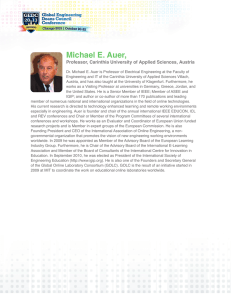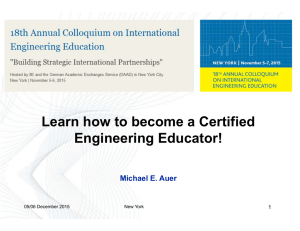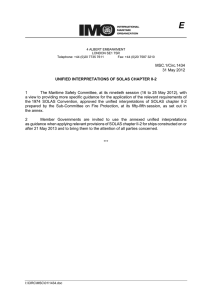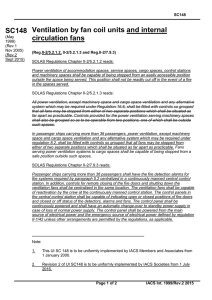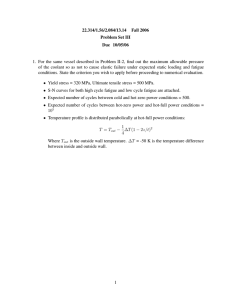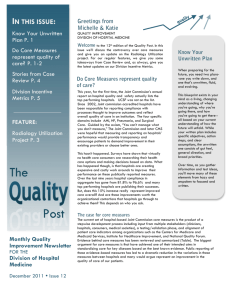IGIP 2011
advertisement
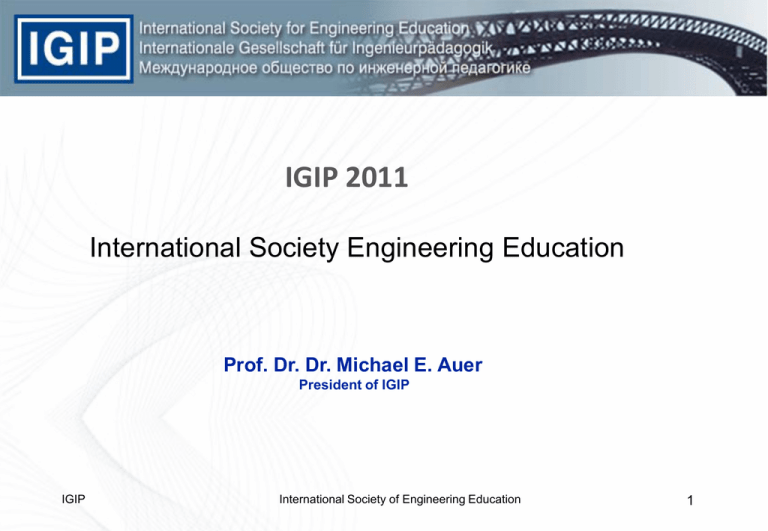
Michael E. Auer IGIP 2011 International Society Engineering Education Prof. Dr. Dr. Michael E. Auer President of IGIP IGIP International Society of Engineering Education 1 Mission of the Society The aims of the International Society for Engineering Education IGIP are • • • • • • • Improving teaching methods in technical subjects Developing practice-oriented curricula that correspond to the needs of students and employers Encouraging the use of media in technical teaching Integrating languages and the humanities in engineering education Fostering management training for engineers Promoting environmental awareness Supporting the development of engineering education in developing countries New competencies of educators are needed as • • • • • IGIP Evaluation management Development competencies Communication skills Teamwork Ethics and intercultural competencies International Society of Engineering Education 2 History of IGIP The International Society for Engineering Education IGIP was founded in 1972 at the University of Klagenfurt (Austria) by Adolf Melezinek. Establishing an engineering pedagogy was a step forward at that time, engineering and pedagogy had never been linked before on a scientific level. What is meanwhile known worldwide as the "Klagenfurter Ingenieurpädagogische Schule" (Klagenfurt School of Engineering Pedagogy) had been established starting with the 1. International Symposium of Engineering Pedagogy in 1972, symposia of IGIP are now held each year. Even in the seventies of the 20th century European integration and standardized profiles for educators were seen as most important factors of education, training and learning. So the International Society of Engineering Education created an international register of engineering educators, which since then guarantees minimum standards in technical expertise and a well-balanced competence profile for engineering educators. The register lists qualified educators who had gone through a curriculum which has been approved by IGIP. Those registered are International Engineering Educator and can use the title INGPAED IGIP. IGIP accredits training centers for "International Engineering Educators", whose teaching matter conforms to IGIP's curriculum for engineering pedagogy. IGIP International Society of Engineering Education 3 IGIP Curriculum - Principles ING-PAED IGIP is a register, which certificates a certain educational level for a teacher, trainer or instructor, which is given by the IGIP curriculum. Any engineering educator who passes the curriculum at any accredited training centre for International Engineering Education, and whose education, training and professional experience meet the IGIP standards may register for the professional register as "International Engineering Educator ING-PAED IGIP". By passing the curriculum as proposed by IGIP in any accredited institution worldwide, IGIP states that a given engineering educator with an ING-PAED IGIP title has all the competencies needed to teach at the state of the art with the best available teaching technologies. IGIP has 52 accredited Training Centres worldwide. The ING-PAED IGIP Register covers already 1170 Engineers from all over the world. Both the Register and the Title "ING-PAED IGIP" will generally improve the position, role and responsibility of engineering educators in society. IGIP International Society of Engineering Education 4 IGIP Curriculum - Content IGIP curriculum is a modular system which consists of: • • • core modules (8 Credit Points), and theory modules (4 CP) and practice modules (8 CP). The core modules include • • theoretical and practical engineering pedagogy laboratory methodology The theory modules include • • • • psychology, sociology, ethics, and intercultural competencies. The practice modules consists of • • • • • • IGIP oral communication skills, scientific writing, working with projects, media, e-learning, and computer aided technologies and a module free for additional topics. International Society of Engineering Education 5 About 1.700 Members of IGIP 55 Institutional Members More than 1.100 Affiliate Members 586 Individual Members IGIP International Society of Engineering Education 6 IGIP Leadership – Executive Committee Michael E. Auer President, Austria Viacheslav M. Prikhodko VP Membership and Regional Affairs, Russia Melany Ciampi VP International Relations, Brazil Pavel Andres VP Educational Affairs, Czech Republic Adolf Melezinek IGIP Honorary Life President, Austria Roman Hrmo, Slovakia Tatiana Polyakova, Russia Teresa Restivo, Portugal Tiia Rüütmann, Estonia Axel Zafoschnig, Austria Dana Dobrovská, President International Monitoring Committee, Czech Republic Ralph Dreher, Director of Research, Germany Herbert Kleber, Secretary General, Austria IGIP International Society of Engineering Education 7 IGIP Scientific Board and IMC Scientific Board Norbert Kraker, Chair, Austria Martin Bilek, Czech Republic José Carlos Marques dos Santos, Rector Univ. of Porto, Portugal Robert Ruprecht, Switzerland Victor K. Schutz, Former IEEE President, USA Vasiliy Zhurakovskiy, Former Minister of Education, Russia IGIP International Monitoring Committee Dana Dobrovska, President, Czech Republic Adolf Melezinek, Honorary Member, Austria Claudio da Rocha Brito, Brazil Fons Dehing, Netherlands Hants Kipper, Estonia José Couto Marques, Portugal Christian Pleul, Germany Ivana Simonova, Czech Republic Alexander Soloviev, Russia Agnes Toth, Hungary International Society of Engineering Education 8 National Monitoring Committees Austria Bulgaria Brazil Czech Republic Estonia Ethiopia Germany Hungary Jordan Kazakhstan The Netherlands IGIP Poland Portugal Romania Russia Slovakia Slovenia Switzerland Turkey Ukraine USA Uzbekistan International Society of Engineering Education 9 IGIP Working Groups • • • • • • • • • • • IGIP Curriculum Development International Aspects of Engineering Education Knowledge Management and Computer-aided Technologies Language and Humanities in Engineering Education Mathematics and Natural Sciences in Engineering Education People and Technology Postgraduate Education and Qualifications Framework Technical Teacher Training Women in Technical Careers Working with Projects Research in Engineering Pedagogy and Engineering Education International Society of Engineering Education 10 IGIP Scientific Journal Publication of scientific results of our members in an own IGIP open access journal . “International Journal of Engineering Pedagogy”; www.i-jep.org IGIP International Society of Engineering Education 11 IGIP Cooperation Partners • IFEES • IEEE Education Society • SEFI • ASEE • IELA IGIP AMERICAN SOCIETY FOR ENGINEERING EDUCATION The International E-Learning Association International Society of Engineering Education 12 IGIP Conferences 2011 • 2011 IGIP Conference Santos, Brazil, 28-30 March 2011 • 2012 Twin Conferences Villach, Austria (40 Years IGIP), 26-28 Sept. 2012 − International Conference on Engineering Pedagogy (ICP) − International Conference on Interactive Collaborative Learning (ICL) • Special Tracks/Sessions 2011 o o o o o o IEEE Educon 2011 Amman, Jordan, 4-6 April REV2011 Brasov, Romania, 28-30 June ICL2011 Piestany, Slovakia, 21-23 Sept. IFEES Global Summit Lisbon, Portugal, 1-2 Oct. FIE2011 Rapid City SD, USA, 12-15 Oct. Online Educa Berlin 2011, 1-3 Dec. • IGIP Regional Conferences 2011 o o o o IGIP Moscow, Russia, March Bratislava, Slovakia, September Dresden, Germany, October Lisbon, Portugal, November International Society of Engineering Education 13 Definition of Engineering Engineering is the discipline, art and profession of acquiring and applying scientific, mathematical, economic, social, and practical knowledge to design and build structures, machines, devices, systems, materials and processes that safely realize a solution to the needs of society. Short definition of engineering: exploiting basic principles of science to develop useful tools and objects for the society. Link between the Sciences and the Society IGIP International Society of Engineering Education 14 New Aspects in Engineering Education • Social Position of Learning According to some estimates, more than 80% of all learning occurs on the job rather than in tertiary and post-tertiary education! • Engineers’ Interaction with Others Engineers tend to spend the majority of their working week (around 60%) engaged in activities which involve interaction with others (meetings, supervision, writing reports etc) and only around 40% is devoted to technical engineering activity. • New Organizational Aspects in Engineering Education On one hand, engineering issues, either in industrial products or in engineering projects, become very complicated and most of them are cross disciplinary ones. On the other hand, the working environment is getting more and more internationalized due to the globalization of the world economy • Improvement of the Agility of Engineering Education One of the approaches in this direction is the creation of virtual educational units. IGIP International Society of Engineering Education 15 New Questions • • • • • • IGIP What learning approaches have to be used to give an effective response to these changes? What are the pedagogies that enable 21st Century learning in engineering? What learning skills in engineering education need to be developed and in what ways have been shown to be successful in achieving them? What pedagogical approaches have been found to support the different phases of the life-long learning continuum or is there also a pedagogical continuum? What are the learning approaches that enable competence in leadership skills in a multi-cultural working environment to be delivered? Ambient technology is becoming a reality – what does ambient learning in Engineering Education look like? How can it be designed, delivered and assessed? International Society of Engineering Education 16 Contact President: Prof. Dr. Dr. Michael E. Auer president@igip.org Secretary General: Herbert Kleber office@igip.org International Society of Engineering Education c/o Carinthia University of Applied Sciences Europastrasse 4 9524 Villach, Austria http://www.igip.org IGIP International Society of Engineering Education 17
